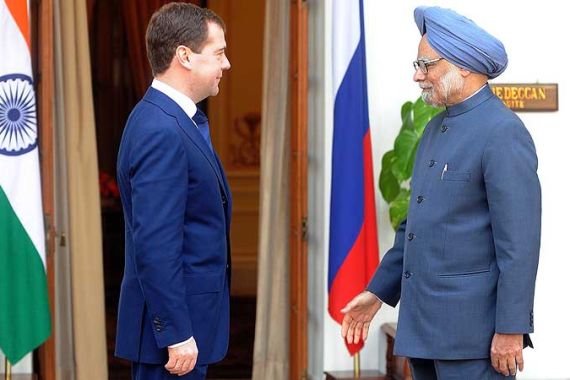Russia eyes Indian defence deals
During a quick visit to Delhi and Mumbai, President Medvedev anticipates signing large military and energy contracts.

 |
| Russia expects a series of major defence and business deals out of Medvedev’s two-day visit to India [AFP] |
Russia and India are expected to sign billions of dollars worth of defence and nuclear deals during the Russian president’s visit starting Tuesday.
An expected highlight of Dmitry Medvedev’s trip will be a $30bn agreement for the design and development of a new stealth fighter jet to be inducted into the Indian air force, Alexander Kadakin, the Russian ambassador to India, said.
The aircraft would be the equivalent of the US air force’s F-22 Raptor.
“There is robust defence cooperation between the two countries,” Vishnu Prakash, a foreign ministry spokesman, said.
“It is not a mere buyer-seller relationship, but the two sides are looking at joint research and development and joint production.”
During the Cold War, India and the Soviet Union shared a deep relationship, while the US tilted toward India’s neighbour Pakistan.
In the post Cold War period, India has moved closer to the US, but its strategic partnership with Russia has endured.
“We can rightfully call it a privileged partnership,” Medvedev said in an interview with the Times of India newspaper published Monday.
Medvedev, who will be accompanied by several key ministers and a large business delegation, will meet with Manmohan Singh, India’s prime minister, before heading to Mumbai, India’s financial hub.
Diplomatic bonds
The core focus of Medvedev’s visit, following trips from the leaders of Britain, the US, France and China to India in recent months, will be to convince New Delhi of Moscow’s importance despite closer Indian ties with other Western powers.
India’s growing ties with the US, underscored by a civil nuclear deal, has made Russia ill-at-ease as New Delhi seeks to reach out to other countries to modernise its military inventory of mostly ageing Russian-made arms and fighter jets.
But due to a history of close co-operation since Soviet days and as members of both the G20 and the emerging group of BRIC nations alongside China and Brazil, India and Russia have developed a close working relationship on global issues.
India has strategic and security worries over Afghanistan, but a lack of direct influence. It sees Russia as an important partner in buffering Chinese influence in the country and across the region, including its nuclear-armed neighbour Pakistan, through the three way Russia-India-China (RIC) dialogue.
While Medvedev will hope for signs that the Indo-Russian relationship is still strong, New Delhi is likely to seek unequivocal backing for its ambition to secure a permanent seat on an enlarged UN Security Council, following statements of support from Paris and Washington in recent months.
Energy and defence deals
Russia is keen to continue suppling technology and expertise to energy-hungry India as it plans to add 63,000 megawatts of nuclear power by 2032 to fuel its economic growth. Russia, the world’s largest energy producer, is competing with France and the United States to meet the rising demand.
India and Russia are expected to sign a general framework agreement for Russia to build two more nuclear power plants in Tamil Nadu in southern India, in addition to the two it is already building there.
US firms are still reluctant to enter the Indian market due to what they see as restrictive liability regulations passed by lawmakers in New Delhi in August, allowing state-backed Russian and French suppliers to capitalise on a lucrative new market.
In March, Vladimir Putin, Russia’s premier, agreed to supply 16 reactors to India during his visit. Russian suppliers are likely to push for further deals during this visit, following a deal this month estimated at $9.3 bn between New Delhi and French nuclear power group Areva for at least two reactors.
As India’s close economic and political partner since Soviet days, Russia monopolised India’s defence market for decades, providing about 70 per cent of the country’s military equipment.
Diversifying order book
India, one of the world’s biggest arms importers, has in recent years sought to diversify its order book as it looks to overhaul its arsenal with an eye on China, awarding contracts to US, European and Israeli firms.
However, India has to award billions of dollars in maintenance contracts for the Russian fighter jets, tanks, ships and missile systems, meaning Moscow remains a crucial defence partner. And the two sides are jointly developing jets and missiles, including the recently-tested Brahmos supersonic cruise missile.
Last year, India and Russia agreed two military pacts, including a 10-year deal on weapons, aircraft and maintenance contracts potentially worth at least $5bn.
Atop Moscow’s wish list in New Delhi is an $11bn contract for 126 fighter jets, and Medvedev is likely to lobby hard for India to select the Russian-made MiG-35 in the face of bids from French, US and other European firms.
But New Delhi has complained of delays in the supply of Russian defence equipment, including a refitted aircraft carrier, resulting in huge cost overruns, affecting military planning and damaging Russia’s reputation as India’s first-choice supplier.